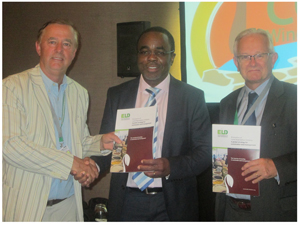
Preventing land degradation offers economic reward

Nicholas Hanley, Head of Unit to International Relations at the European Commission, Luc Gnacadja, Executive Secretary of UNCCD and Richard Thomas, Assistant Director of the Drylands Ecosystems programme at the UNU Institute for Water, Environment and Health (UNU-INWEH). (Photograph by Hilmah Hashange)
The ELD is an initiative for a global study on the economic benefits of land and land-based ecosystems. The initiative highlights the value of sustainable land management and provides a global approach for analysis of the economics of land degradation. It aims to make economics of land degradation an integral part of policy strategies and decision making by increasing the political and public awareness of the costs and benefits of land and land-based ecosystems.
Statistics in the report, which was launched during the eleventh Conference of Parties (COP11) in Windhoek, reveal that applying known sustainable land management practices can increase global crop yields by 2.3 billion tonnes of food annually at a value of about US$1.4 trillion.
The report details why land is chronically undervalued due to the practice of emphasizing short-term economic gains which leads to intensive, unsustainable resource extraction, and ultimately to land degradation.
According to the report, globally over a quarter of usable land on earth has already been degraded, and the situation is an on-going crisis, affecting billions of people especially those who depend directly on degrading land for sustenance and daily living. “This issue is even more urgent in light of the combined trend of decreasing crop yields and the growing human population” the report states.
The initiative aims to aid the prevention and reversal of land degradation globally by providing the scientific community, governments, and the private sector with a scalable, adaptable toolbox for total economic valuations. According to the report, this is a necessary prerequisite to reduce social tensions arising from this issue, in recognition of the limits of finite natural resources. Sustainable land management can provide environmental, economic, and social benefits for the greater good on a long-term scale, and this objective can be arrived at with the assistance of the tools and methodologies outlined in the report.
The results from the ELD initiative will provide a foundational platform to guide land use, and investment and equitable planning decisions that do not result in the further impoverishment of rural farmers or degradation of land.
The interim report contains a preliminary analysis of the global status of research in this arena. It shows that there is a serious lack of capacity within developing nations to perform their own research and implement their own solutions to prevent land degradation. The report also identifies the global failures to actually get communities to adopt sustainable land management practices.











































